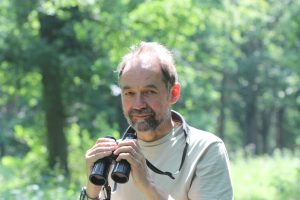Professor William J. Sutherland CBE Awarded the 2024 CIEEM Medal
Professor Bill Sutherland is one of the world’s leading conservation scientists. His research spans over 40 years, initially focussing on behavioural and population ecology whilst he was based at the universities of John Moores, Oxford, Liverpool and East Anglia. Bill showed how behaviour and population ecology could be linked through game theory models of the decisions individuals make, and that such models can then be used to predict the consequences of future states, such as agricultural change or climate change. This was summarised in his Oxford University Press monograph From Individual Behaviour to Population Biology.

Image credit: Pakenham
Bill moved to Cambridge in 2006, to take up the prestigious Miriam Rothschild Chair of Conservation Biology, and much of his later career has been devoted to developing novel processes for integrating science and policy including horizon scanning and evidence-based conservation. With global collaboration he created the website Conservation Evidence. This reviews the evidence for the effectiveness of more than three thousand conservation actions, and provides a set of tools for making evidence-based decisions and embedding evidence into practice. This work is summarised in his most recently edited open-access book Transforming Conservation: a Practical Guide to Evidence and Decision Making (2023).
‘Conservation Evidence’ is bringing about transformational change in conservation through ensuring policy and practice are more efficient and effective. Within this enterprise, Bill and his team have worked with literally 1,100+ named practitioners, policy makers, funders and others to support fundamental strategic and cultural shifts towards more effective conservation action. Cambridge University recently identified his work with Conservation Evidence as having the greatest impact of any research in the entire university!
Bill regularly advises government and conservation organisations. He is at the forefront of predicting the impacts of environmental change and developing novel approaches for integrating science and policy, thereby having significant impact on global conservation efforts. He leads ‘horizon-scanning’ exercises, which have a global reach, shaping environmental research and policy priorities. Periodically, he leads reviews of emerging global conservation concerns, receiving international media attention. His 15th annual horizon scan was published in Trends in Ecology and Evolution in December 2023, identifying 15 issues including making food from air, light-free photosynthesis, earthworm declines, benchtop DNA printers and use of ecoacoustics to study soil.
He has authored or edited 16 books. The Gratis book scheme he established has given away more than 5,000 books to 137 countries outside Western Europe etc. Remarkably, his research outputs have been cited more than 69,000 times (averaging more than 4,500 citations per annum since 2020), and nine of his papers/books are ‘citation classics’, each cited more than one thousand times).
Until autumn 2023, he held the Miriam Rothschild Chair in Conservation Biology in the Department of Zoology at Cambridge, and is a Professorial Fellow in St Catharine’s College, running its Biosecurity Research Initiative. He was integral to the establishment of the Cambridge Conservation Initiative. He now holds a director of research position in the Department of Zoology.
Bill has served on advisory committees for bodies including Natural England and The National Trust, was a trustee of Flora and Fauna International, and served as President of the British Ecological Society (2013-2015). He received Honorary Membership of the BES in 2019, which is the highest award the BES gives, recognising exceptional contributions at international level to the generation, communication and promotion of ecological knowledge and solutions.
Bill’s research and leadership have been recognised through many awards, most recently as Commander of the British Empire in 2021 ‘For services to evidence-based conservation’, Fellowship of the Royal Society (2023), and Membership of the Academia Europaea (2023). He was awarded The International Ecology Institute 2023 Prize in terrestrial ecology, and earlier was awarded the Scientific Medal of the Zoological Society London (1997), two Marsh awards (Ecology 2001, Conservation 2005), and the Distinguished Service Award of the Society for Conservation Biology (2013).
Bill is an exceptional ecologist and conservation scientist, an outstanding naturalist and teacher, and is widely acclaimed for his generous encouragement of students and early-career researchers.
He is an outstandingly deserving recipient of the CIEEM Medal.
Bill said the following when he found out he had been awarded the CIEEM Medal:
As the professional body for ecologists and environmental sciences, CIEEM is central to the delivery of delivery of scientific knowledge for practitioners. Improving the effectiveness of environmental decision making is central to my last twenty years of work so I am delighted and honoured to be presented the CIEEM award.
